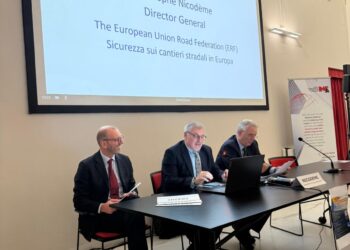Rome, Italy | 10 November 2023
The third edition of the International Conference on Road Safety held in Rome and AISICO test lab from November 9-10 showcased a focused discussion on “Passive Safety,” emphasizing road equipment’s pivotal role in urban and extra-urban safety measures.
Organized by AISICO with the support of the European Union Road Federation (ERF) and this year, IntOroadS – the International Organization for Road Safety, the conference sought to encourage multifaceted dialogues among public institutions, road operators, users, and manufacturers.
The introductory session featured speeches by the Director of the MAXXI Museum, CEO of Aisico Ing. Stefano Calamani, ERF Office and Communications Manager Nilufar Lebasi, and President of IntOroadS Ing. Ottavia Calamani.
Unlike previous editions, the event expanded its focus on passive safety measures, exploring the state and evolution of road equipment across urban and extra-urban settings. The first day, hosted at Rome’s MAXXI Museum, unfolded through four enlightening sessions:
- Round table discussion on Updating Road Legislation for Sustainability and Safety, with participation from the Italian Deputy Minister of Transport and a representative from the European Conference of Directors of Roads (CEDR) amongst other speakers.
- A session highlighting the imperative need for road users’ safety considering the current scenario.
- Round table focusing on present and future actions for enhancing road safety.
- A session exploring efficient sustainability and technology-driven solutions for safer roads.
The subsequent day included a visit to the AISICO test lab premises in Pereto, culminating in a crash test of an H4b safety barrier involving a 38-ton heavy vehicle at a speed of 68 km/h and a 20-degree angle.
Building upon the success of previous editions, this year’s event reinforced the importance of collaboration among stakeholders, emphasizing the significance of industry-public authority cooperation in achieving road safety objectives in the coming years.
The European Union plays an essential role in managing safety across its extensive 85,000 kilometers of road infrastructure within the TEN-T network. Prioritizing the reduction of road fatalities and serious injuries is one of the EU priorities in terms of Road safety, therefore, the design and operation of roads, tunnels, and bridges must adhere to stringent safety standards. The transition to the new mobility driven by digitization, decarbonization, and innovation, will bring new challenges and opportunities to road safety that should be considered.
-
Safer, Smarter Roads Discussed at the 25th Belgian Road Congress
October 10, 2025 -
ERF calls for Smarter, Safer Road Work Zones at Bologna Forum
October 9, 2025




